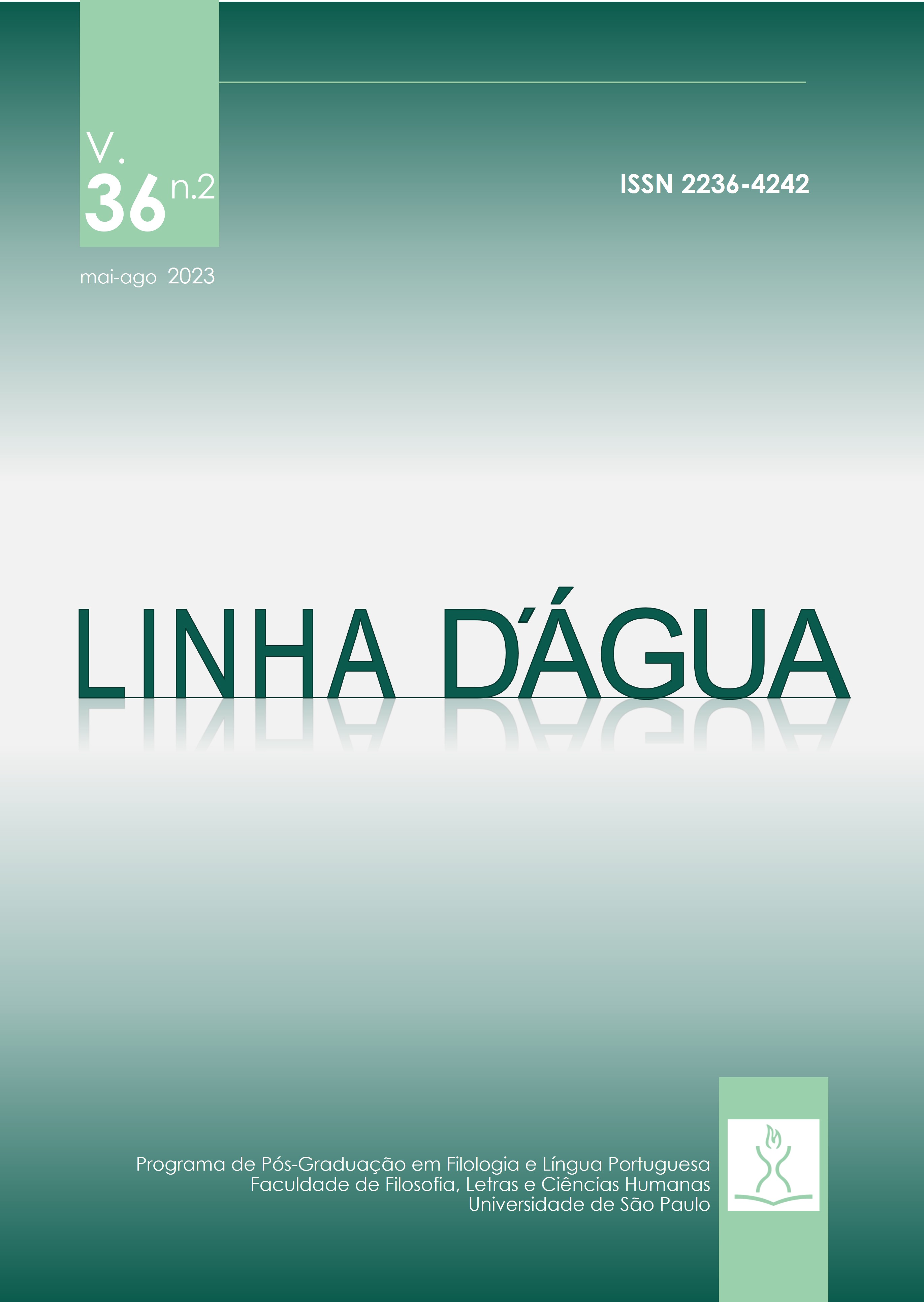A pós-verdade como paradigma argumentativo
DOI:
https://doi.org/10.11606/issn.2236-4242.v36i2p124-137Palavras-chave:
Discurso, Informação, Fake News, Argumentação, Língua portuguesaResumo
Ainda sem consenso, o termo pós-verdade se relaciona estreitamente às fake news e ao discurso informativo de modo amplo, impactando, portanto, nossa comunicação nos diversos dispositivos digitais. Pensando a argumentatividade, em seu sentido amplo, como fundamento de toda troca linguageira, o estudo apresenta uma perspectiva sobre o conceito de pós-verdade e, a partir dele, reflete sobre suas consequências na construção argumentativa. Para tanto, são analisados cinco textos, dos quais três são relativos à pandemia de covid-19, veiculados nas diferentes redes sociais em abril de 2020 e identificados como “Fake” pelo Ministério da Saúde brasileiro, e dois deles circularam na propaganda eleitoral de televisão durante a campanha eleitoral à presidência do Brasil, em outubro de 2022. A análise demonstra o impacto da pós-verdade como paradigma argumentativo, inaugurando um padrão de não persuasão favorecido pela troca entre iguais. Como consequências linguístico-discursivas, são observados o apelo a implícitos (compartilhados pelos interlocutores) e a irrelevância de uma racionalidade argumentativa calcada na lógica semântica.
Downloads
Referências
ANSCOMBRE, J. C.; DUCROT, O. L'argumentation dans la langue. Liège/Bruxelas: Pierre Mardaga, 1988.
BERCKEMEYER, F. A mentira da pós-verdade. In: Revista Uno. A era da pós verdade: realidade versus percepção. Nº.27, p. 26-29, 2017. Disponível em: https://www.revista-uno.com.br/numero-27/a-mentira-da-pos-verdade/. Acesso em 10/07/2018.
CASTELLS, M. O poder da comunicação. Trad. Vera Lúcia Mello Joscelyne. 1a. ed. São Paulo/Rio de Janeiro: Paz e Terra, 2015.
CESARINO, L. Pós-verdade e a crise do sistema de peritos: uma explicação cibernética. Ilha Revista de Antropologia, Florianópolis, v. 23, n. 1, p. 73–96, 2021. DOI: http://doi.org/10.5007/2175-8034.2021.e75630.
CHARAUDEAU, P. O discurso das mídias. São Paulo: Contexto, 2006.
DOMINGUEZ, M. G. A. Estratégias argumentativas para a construção de pós-verdades. Anais do VII SIMELP - Estudos da Linguagem em perspectiva: caminhos da interculturalidade. Porto de Galinhas, 2020.
DUCROT, O. Argumentação linguística e argumentação retórica. Letras de Hoje, Porto Alegre, v. 44, n. 1, jan./mar., 2009.
FOUCAULT, M. Entrevista a Alexandre Fontana. Microfísica do Poder, p.12-13, 1979.
GARCIA, O, M. Comunicação em prosa moderna: aprenda a escrever, aprendendo a pensar. Rio de Janeiro: FGV, 2010.
KOCH, I. V. Argumentação e linguagem. São Paulo: Cortez, 2002.
LÉVY, P. Cibercultura. Trad. Carlos Irineu da Costa. São Paulo: Editora 34, 2009.
OXFORD. Word of the year 2016. Oxford Languages. Oxford University Press. Disponível em https://languages.oup.com/word-of-the-year/. Acesso em 04.04.2020.
PÊCHEUX, M. Semântica e Discurso: uma crítica à afirmação do óbvio. Campinas: Ed. Unicamp, 2009.
WARDLE, C. Fake News. It’s complicated. First Draft, February 16, 2017. Disponível em: https://firstdraftnews.org/articles/fake-news-complicated/. Acesso em: 20.10.2022.
Publicado
Edição
Seção
Licença
Copyright (c) 2023 Michelle Gomes Alonso Dominguez

Este trabalho está licenciado sob uma licença Creative Commons Attribution-NonCommercial 4.0 International License.
A aprovação dos manuscritos implica cessão imediata e sem ônus dos direitos de publicação para a Linha D'Água. Os direitos autorais dos artigos publicados pertencem à instituição a qual a revista encontra-se vinculada. Em relação à disponibilidade dos conteúdos, a Linha D'Água adota a Licença Creative Commons, CC BY-NC Atribuição não comercial. Com essa licença é permitido acessar, baixar (download), copiar, imprimir, compartilhar, reutilizar e distribuir os artigos, desde que para uso não comercial e com a citação da fonte, conferindo os devidos créditos autorais à revista.
Nesses casos, em conformidade com a política de acesso livre e universal aos conteúdos, nenhuma permissão é necessária por parte dos autores ou do Editor. Em quaisquer outras situações a reprodução total ou parcial dos artigos da Linha D'Água em outras publicações, por quaisquer meios, para quaisquer outros fins que sejam natureza comercial, está condicionada à autorização por escrito do Editor.
Reproduções parciais de artigos (resumo, abstract, resumen, partes do texto que excedam 500 palavras, tabelas, figuras e outras ilustrações) requerem permissão por escrito dos detentores dos direitos autorais.
Reprodução parcial de outras publicações
Citações com mais de 500 palavras, reprodução de uma ou mais figuras, tabelas ou outras ilustrações devem ter permissão escrita do detentor dos direitos autorais do trabalho original para a reprodução especificada na revista Linha D'Água. A permissão deve ser endereçada ao autor do manuscrito submetido. Os direitos obtidos secundariamente não serão repassados em nenhuma circunstância.











